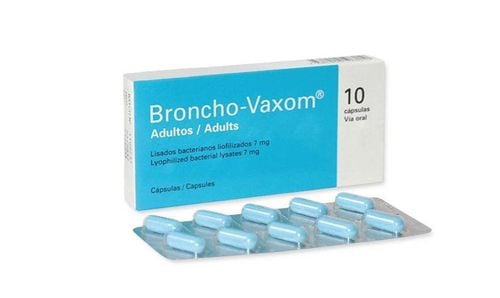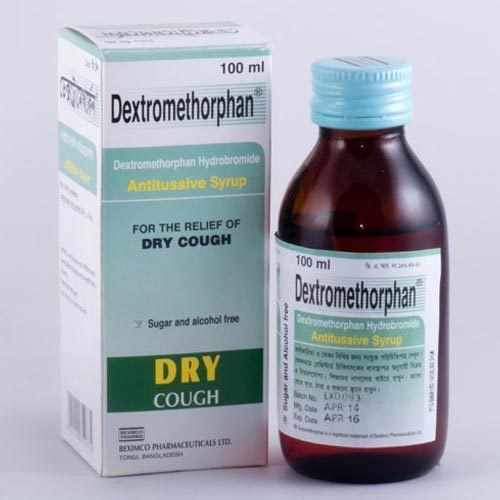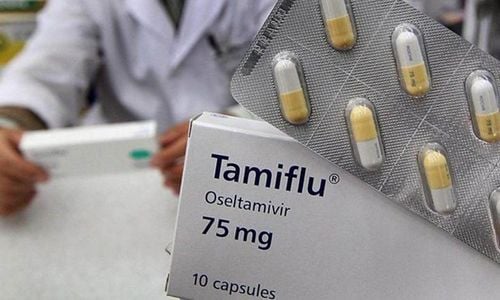This is an automatically translated article.
Cough is quite common in children. That makes many parents very concerned and sometimes even worried. So, are the concerns and questions of parents correct? And when to really worry when a child has a cough. This article will provide detailed information to help parents better understand this disease.
1. What causes cough?
Natural reflex cough to protect the child's airway from obstruction. The body coughs to:
Clear irritants in the throat and chest, such as mucus, dust or smoke. The airways or lungs become inflamed due to an infection. Most coughs are caused by a cold, but there are a number of other reasons your baby might have a cough, including allergies, asthma, and sinus infections. In case the baby has a cough, when to worry? Coughs are common in young children and are usually not dangerous. Cough in infants is less common. If your baby is under 4 months old, a cough could be a sign of something serious. In general, with a baby with a cough, parents should call the doctor if:
Child under 4 months of age Breathing more rapidly than usual or it seems that the child has a dangerous cough such as difficulty breathing Wheezing Coughing up substances mucus that is yellow, green, or even streaked with blood Does not drink anything during multiple feedings Has a fever and doesn't act like itself Has a chronic illness that also causes a cough such as heart or lung disease Cough So intense that vomiting can occur A persistent cough when something is stuck in the throat Cough that doesn't get better after about two weeks. And of course, if the child seems to be having severe breathing difficulties, give him or her first aid.
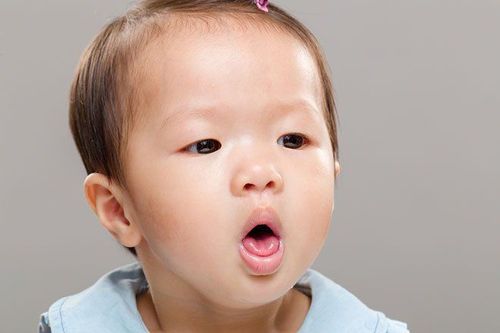
Ho là một trong các triệu chứng thường gặp ở trẻ nhỏ
2. Types of children's cough
There are two types of cough that help keep your child's airways clear and sometimes the cause of both can be the same:
Your baby has a productive cough A productive cough will often be accompanied by mucus or phlegm , which is a mixture of mucus, debris, and cells from the lungs.
Baby dry cough Cough is dry or does not cause mucus.
3. Cough symptoms in babies
There are many reasons why a child has a cough. Symptoms as well as some of the most common causes of a noticeable cough:
3.1. Baby coughs stuffy nose Possible cause: Common cold
Other symptoms:
Sneezing Watery eyes Little or no appetite Mild fever Colds are the most common cause of cough in children. If the child has a cold:
Do not give the child medicine to relieve the cough. Coughing can be important for children to clear their airways. Let your child try honey if they are over 1 year old. You can give your child 2 to 5 ml of honey or corn syrup to thin the mucus and soothe a cough (but never give honey to a child under 1 year old as it can cause poisoning in the child). , a rare but potentially fatal disease). 3.2. Baby coughs with cold breath and difficulty breathing Cause of cough: Respiratory syncytial virus (RSV)
Respiratory syncytial virus RSV is most common in infants and young children, although children of all ages are may have this disease. Normally, the respiratory syncytial virus RSV causes only cold-like symptoms in healthy children. But it can lead to more serious respiratory illnesses, such as bronchiolitis (inflammation of the small breathing tubes) and pneumonia, especially in infants younger than a year old. Respiratory syncytial virus (RSV) usually strikes from November to mid-March
Other symptoms include cough (if RSV could lead to bronchiolitis or pneumonia):
Cough gets worse Wheezing Rapid breathing Fever The surrounding lip and fingernails are bluish or gray (due to decreased oxygen in the blood) What to do: Most children recover from RSV without treatment, but call your doctor if you suspect that your child has may be developing bronchiolitis or pneumonia.
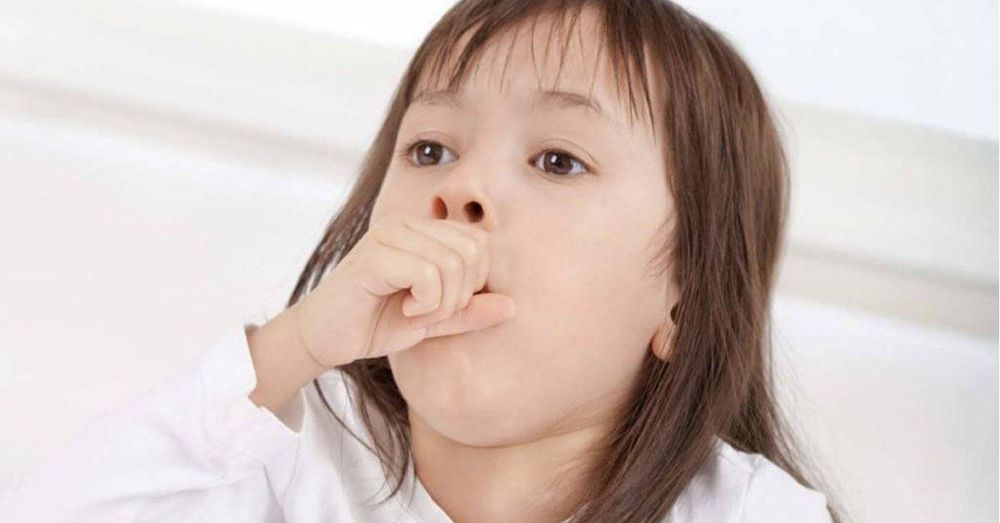
Bé ho có thể do viêm tiểu phế quản hoặc viêm phổi
3.3. Baby coughs with fever and difficulty breathing Possible causes: Pneumonia or bronchitis
Pneumonia, an infection in the lungs, that starts out as a cold. Bronchitis occurs when the bronchi (the tubes that carry air to the lungs) become infected, usually after a cold or flu. It can cause a persistent cough for several weeks.
Other symptoms:
Body aches Chills What to do: If your child has symptoms of pneumonia or bronchitis, call the doctor for examination and treatment. Your child may need antibiotics to clear up the infection and cough. (If the infection is viral, the child will get better without antibiotics.)
3.4. Baby cough due to laryngeal infection Possible cause: laryngeal leukocytosis
Acne is usually caused by an infection of the vocal cords (larynx), trachea (trachea) and bronchial tubes (bronchi) leading to swelling. Cough caused by swollen vocal cords produces a sound similar to a seal barking.
Other symptoms:
Cough that gets worse at night or the child has a lot of coughing A high-pitched whistling sound when the child breathes in. What to do: This cough sounds horrible but in most cases it's not too serious and can be treated at home. Here are some tips for treating a child's cough:
Comfort your child to calm him down and help him breathe better if he wakes up coughing. Make sure your child drinks plenty of water. Elevate the child's head. If your baby is younger than a year old, you can try elevating your baby's head a little while he sleeps to help ease the cough. Furthermore, do not share pillows with infants, as this increases the risk of SIDS. Use a cool mist humidifier or take your child to a steam bath. Humidification can help reduce airway swelling, although it has not been scientifically proven.
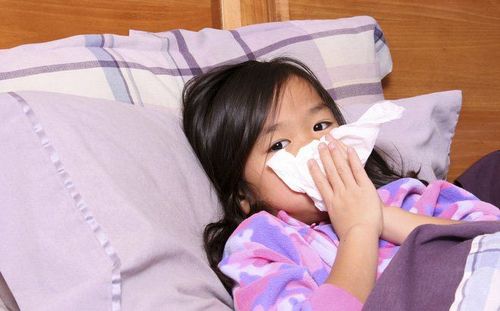
Trẻ ho nhiều có thể do nhiễm trùng thanh quản
3.5. Baby's cough doesn't go away Possible causes: Allergies, asthma, environmental irritants and sinusitis
Allergies are the body's response, such as a dry cough, usually due to an overactive immune system exceed. The lining of the airways that carry air to the lungs is inflamed from asthma which may include a cough, or a cough that doesn't appear at all. Environmental irritants can include things like cigarette smoke or pollution. Sinusitis is an inflammation of the lining of the nose and sinuses. It can be a virus or bacteria. Other symptoms:
A stuffy or runny nose with mucus in the Cough at night or after exposure to cold (if it's asthma) Cough and runny nose that has persisted for at least 10 days without symptoms Your symptoms improve and your cough tends to get worse at night (a sign of sinusitis) What to do: If you suspect your cough is caused by allergies, asthma, or sinusitis, make an appointment with your doctor for a diagnosis. Soon. (If the doctor determines that the child has bacterial sinusitis, he or she will prescribe antibiotics. The cough will stop once the sinuses are open again.)
When an environmental irritant is suspected in your throat, you'll want to identify and eliminate the problem immediately.
3.6. Baby coughs with no other signs of illness Possible cause: Swallowing or inhaling foreign body
Cough time lasts a week or more without any other signs of illness (such as runny nose, fever or coma) or allergies (clear discharge) can mean that the child has something stuck in his throat or lungs. This condition is more common in young children who are mobile, reach for small objects and like to put objects in their mouths.
What to do: If a doctor suspects a foreign body is causing the cough, they will order a chest X-ray. If the test results show that something is stuck in the lung, the object will have to be surgically removed.
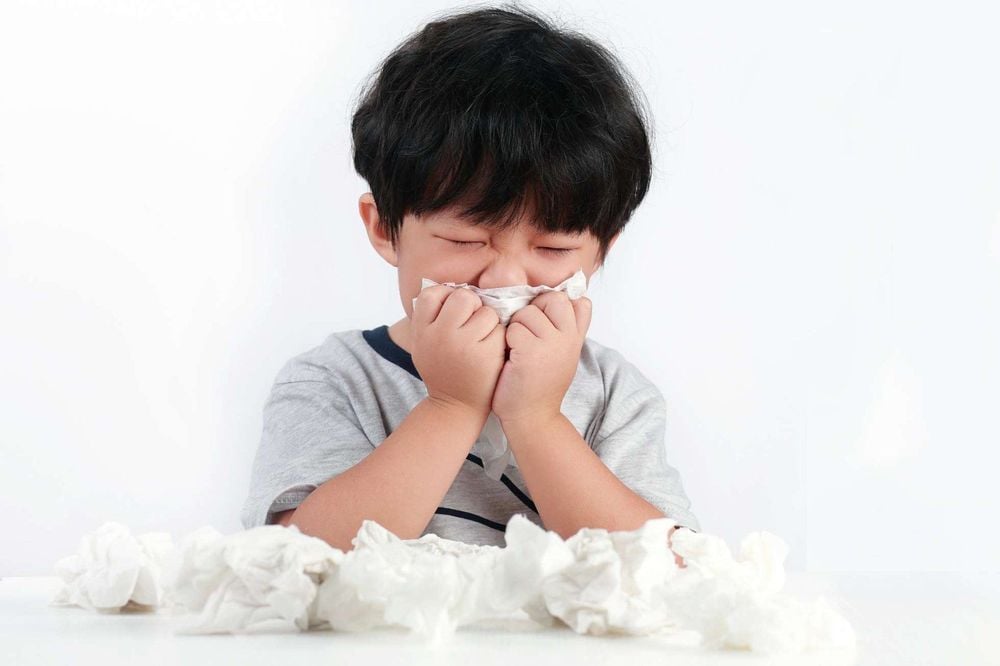
Trẻ ho kéo dài có thể kèm theo sổ mũi
3.7. Baby coughs with a "cough" sound Possible cause: Whooping cough
Whooping cough is a highly contagious respiratory infection caused by bacteria called pertussis. Whooping cough has become less common thanks to the widespread use of the DTaP vaccine, but outbreaks still occur.
Other symptoms:
Children with whooping cough often cough continuously for 20 or 30 seconds, then have difficulty breathing and before the next cough begins. Sneezing, runny nose and mild cough, .. of a cold can be present for up to two weeks before the onset of more severe coughs. If your child shows signs of whooping cough, call your doctor right away. Because whooping cough can be severe, especially in children younger than a year old. If your child has whooping cough, the doctor will likely prescribe antibiotics.
3.8. Baby coughs with thick yellow or green sputum Possible cause: cystic fibrosis
Cystic fibrosis affects children and a persistent cough with thick yellow or green mucus is one of the strongest signs that a child has may have inherited the condition.
Other symptoms:
Recurrent pneumonia and sinus infections No weight gain Salty skin Large, greasy stools. What to do: If the doctor confirms the diagnosis of cystic fibrosis, antibiotics will be given to treat the associated lung infections and different techniques will be used to help cough up thick secretions in the lungs.
3.9. Frequent coughing This is unlikely in infants, although sometimes babies cough to check their voice or to get attention. However, for a toddler or older child who has a cough due to an illness and continues to cough out of habit, even after the child is well. If your child coughs out of habit, he won't do so while he's asleep and this will rarely interfere with his eating or speaking. However, it can be disruptive (in the classroom, for example).
What to do: Usually, if you wait, the cough will probably stop on its own. If your child is 4 years or older, you can give them lozenges or drops to relieve their cough.
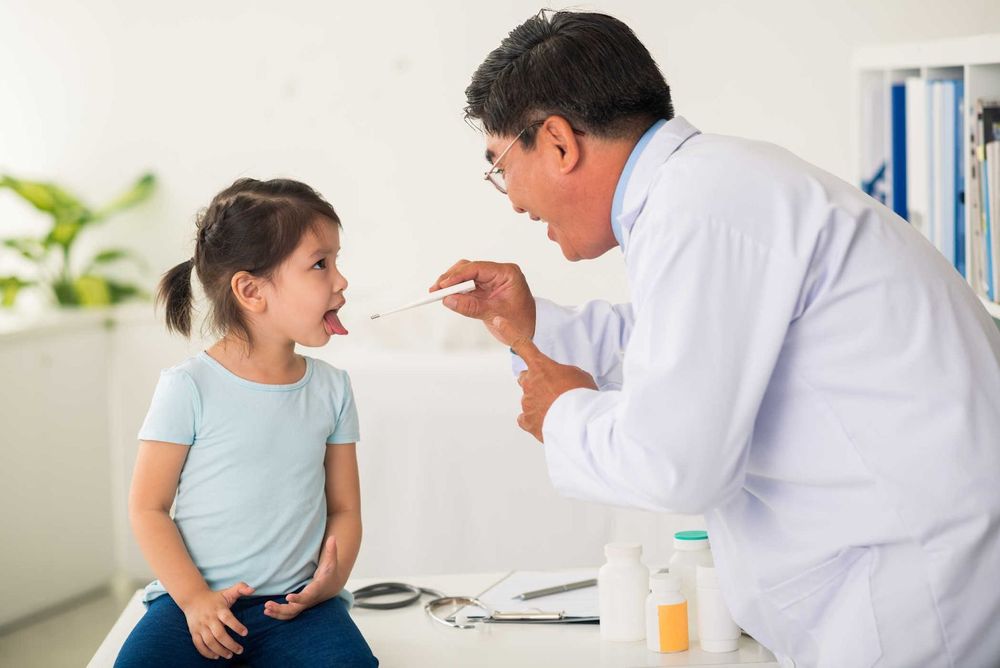
Bệnh ho gà là một bệnh nhiễm trùng đường hô hấp cần được thăm khám bởi bác sĩ chuyên khoa
4. Use cough medicine for children
Cough medicine should not be given to infants. If your child is older, see your doctor before giving your child over-the-counter cough or cold medicine. Cough medicines are generally not recommended for young children, and the American Academy of Pediatrics says you can treat coughs and colds without them.
Under 4 years old: Do not arbitrarily give children cough or cold medicine. 4 to 6 years: Use these medications only if your doctor recommends it. From 6 years and older: You can give your child over-the-counter cough or cold medicine, but make sure the medicine is appropriate for the child's age and accurately measure each dose according to the instructions for use. Also, you should never give your child more than one cough or cold medicine at the same time. In case the child has a cough that does not go away for a long time, parents need to take the child to a reputable medical facility for examination. Vinmec International General Hospital, with a team of leading pediatric doctors and modern equipment, is an address that many parents trust in the treatment of children's diseases, such as cough with phlegm, cough with wheezing. wheezing, high fever, pneumonia,...
In addition, parents should also add some supportive foods containing lysine, essential micro-minerals and vitamins such as zinc, chromium, selenium, vitamins. group B, ... helps to fully meet the needs of nutrients while supporting the immune system, enhancing resistance, reducing the risk of upper respiratory tract infections, bronchitis, flu.
Lysine is very necessary for the development of children, Lysine promotes the production of digestive enzymes to stimulate children to eat better and digest easily and effectively, increase food metabolism, maximize absorption of nutrients. Nutrition from food.Strengthening lysine for babies helps the body create antibodies, develop resistance to help reduce cough, thin phlegm in children.
Parents can learn more:
Why do you need to supplement Lysine for your baby?
Please regularly visit Vinmec.com website and update useful information to take care of your baby and family.
Reference sources: Babycenter.com




